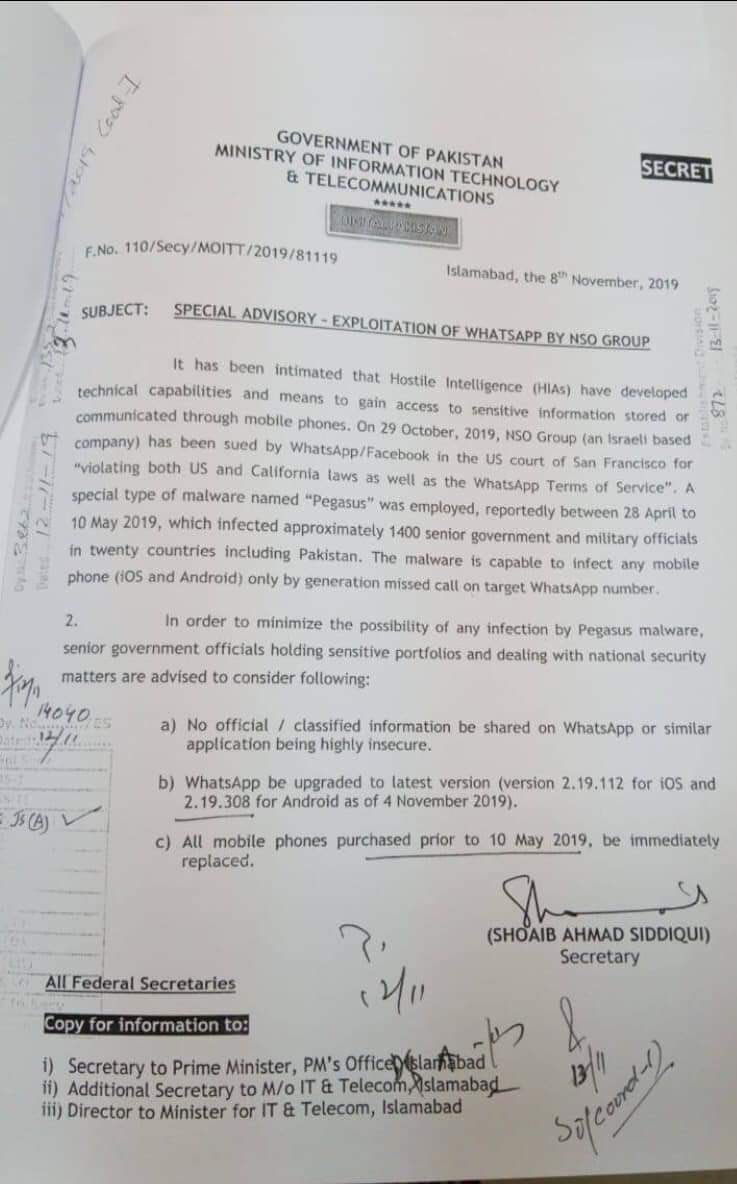ISLAMABAD/LAHORE: Pakistan is trying to develop a local instant messaging application to protect official data and sensitive information from hackers and hostile intelligence agencies, senior government officials said on Thursday, as the government of the South Asian nation considers banning senior government and military officials from using WhatsApp at official premises.
Last month, officials at Whatsapp told media senior government officials in multiple US-allied countries were targeted earlier this year with hacking software that used Facebook Inc’s WhatsApp to take over users’ phones. Victims belonged to the United States, the United Arab Emirates, Bahrain, Mexico, Pakistan, India and other nations.
“We have been working to improve our cyber security and develop a messaging application like WhatsApp for government officials,” Dr. Arslan Khalid, Prime Minister Imran Khan’s focal person on digital media, told Arab News. “This local application will help us protect sensitive government data and other classified information from hostile spying agencies and hackers.”
Pakistan is ranked among the top seven countries for inadequate cyber security, with 25 percent of its mobile phones and 14.8 percent of computers infected with malware, according to a study conducted by technology site Comparitech.
Authorities have proposed introducing intranet in government offices and developing a local alternative to WhatsApp after NSO – an Israeli spyware firm – was sued by WhatsApp/Facebook on October 29 for “violating both the US and California laws as well as the WhatsApp terms of service.”
A special type of malware named “Pegasus” was employed, reportedly between 28 April and 10 May 2019, which affected approximately 1400 senior government and military officials in twenty countries including Pakistan.
“The malware is capable of infecting any mobile phone [iOS and Android] only by generating a missed call on the targeted WhatsApp number,” a special advisory issued by the Ministry of Information Technology earlier this month said.
The advisory, a copy of which is available with Arab News, directed senior government officials holding “sensitive portfolios and dealing with national security matters” to consider that “no official/classified information be shared on WhatsApp or similar applications” for security reasons.

In order to minimize the possibility of any infections by Pegasus malware, the ministry also directed government functionaries to immediately replace all mobile phones purchased prior to 10 May 2019.
Against this backdrop, the government has started developing an intra-communication system, a WhatsApp-like service, to ensure “no data leaves GoP [Government of Pakistan] data centers.”
“It will be an official channel of communication which will provide an interlink to all federal ministries to share official documents,” Ali Khan Jadoon, a ruling party lawmaker and chairman of the National Assembly Standing Committee on Information Technology, told Arab News.
Under the new system, any government official using the local area network would not be able to use WhatsApp, Facebook messenger and other social media platforms.
“This network will have the ministry of defense, interior and others on it since we don’t want any sensitive information to be leaked,” Jadoon added, saying each government official would have a unique ID to use the system and anyone trying to leak information would be identifiable with their ID.
He said the application, which costs round Rs1.3 billion ($8.37 million), would be launched by June 2020: “Everyone will be on this [application] including the president and the prime minister.”
The National Information Technology Board (NITB) is also implementing an e-government program in all federal ministries to protect official data and sensitive information from leaking to hackers or hostile intelligence agencies.
“We have so far completed our work in 28 ministries out of 42, and the remaining will also be converted to an e-government program by June next year,” Faisal Iqbal, director-general NITB, told Arab News.
Asked about rumors that the government may curb freedom of speech and freedom of expression by expanding the local instant messaging app to the public, just as it happened in China, Dr. Arslan Khalid said the government wanted to protect official data only.
“We are not planning to restrict the public use of social media or curtail freedom of expression. All these rumors are baseless,” he said. “Even government employees can use WhatsApp and any other social media platforms for personal interaction once they are outside of their public offices.”













